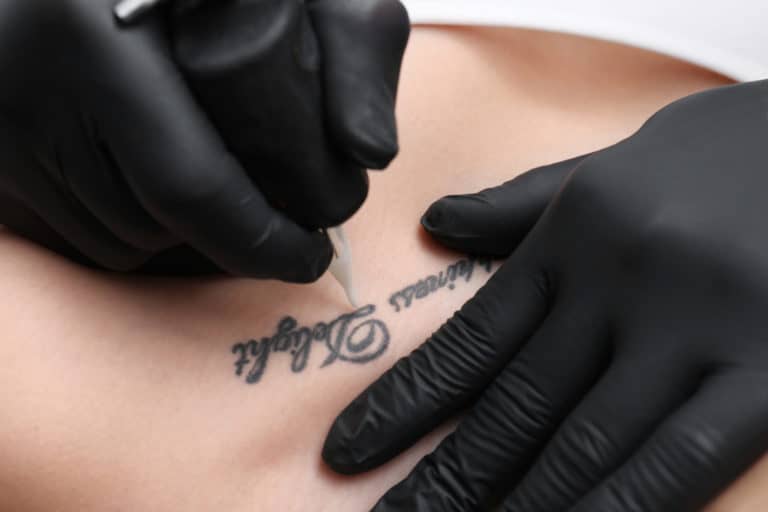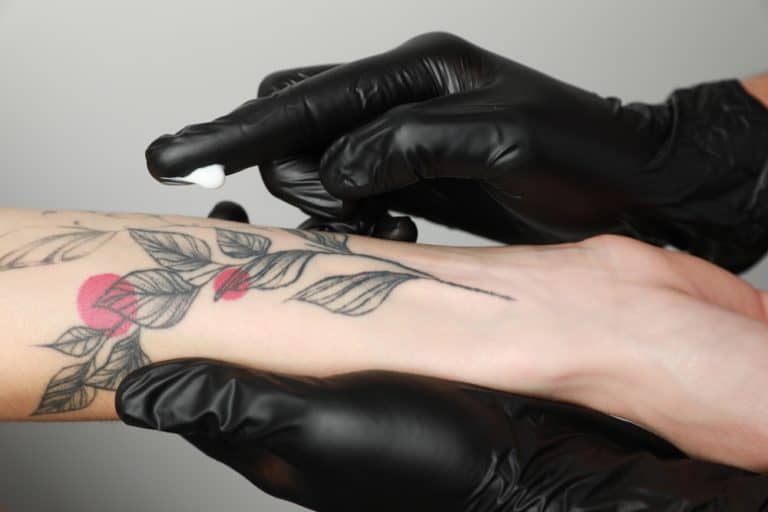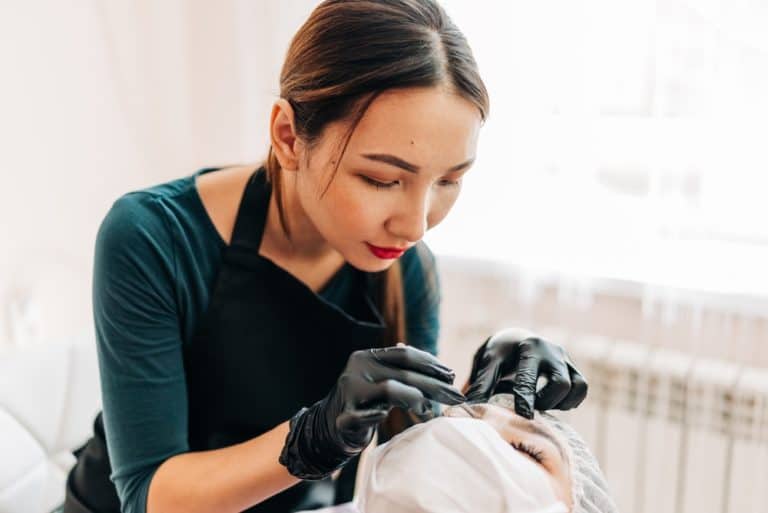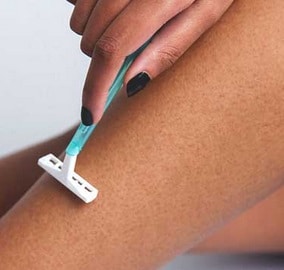Are Neck Tattoos Dangerous? What You Must Know
Tattoos have gained significant popularity over the years, and many people get tattoos for multiple different reasons, and neck tattoos seem to be one of the many tattoo placements that people have begun to want more and more. It is a huge decision to get a neck tattoo, and it should not be taken lightly. Your neck is rarely hidden or covered with clothes, and for this reason, neck tattoos will change the way most people see you, and they can affect your future prospects. But are neck tattoos dangerous?
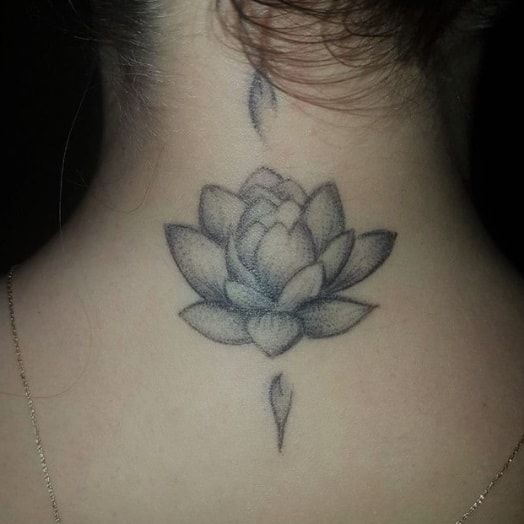
Neck tattoos can be dangerous if the right precautions are not taken. They can result in allergic reactions, infections, affect sweating, cause keloid scarring, damage important nerves in the neck, and even hide skin cancer that you may not notice in your neck, which is regularly exposed to the sun.
Even though tattoos are becoming more common and used as statement pieces, there are still risks that you should know before you decide to get one, especially a neck tattoo. Although the likelihood of something going wrong is small, the possibility is still there, and you should be aware of what could happen when getting a neck tattoo. Let us go through the possible risks and things you should consider with neck tattoos.
Risks With A Neck Tattoo
Neck tattoos can be risky and can lead to unforeseen dangers if you are unaware of the risks. There are multiple risks to keep in mind with neck tattoos. When getting a tattoo, numerous needles are depositing ink into your skin. This can cause complications and skin reactions in some people. The following are just a few risks to consider when it comes to neck tattoos.
Allergy To The Ink
Manufactures of tattoo pigments and inks do not have to reveal the contents of their pigments or inks, so the complete composition of the ink that is used on you is most often unknown. Some tattoo inks are actually pigments in a carrier solution, and these pigments are primarily made from metal salts, but they can be made from plastics or vegetable dyes too, these are what provide the color.
These inks and pigments may cause you to have an allergic reaction. This allergy can happen during the tattoo process or after the tattoo is completed. The severity of this reaction can differ from person to person and can depend on what the ink or pigment contains.
Some indications of an allergic reaction can include hives, red rashes, severe itching, and swelling. The swelling is what is the most concerning when it comes to neck tattoos because if the swelling is severe, then this can cause issues with breathing.
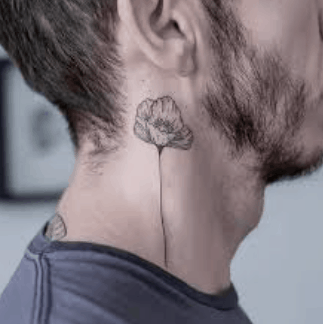
Other symptoms that are a bit more on the rare side but can arise include raised scaling patches of skin, blisters, deep lumps under the skin, a watery fluid leaking from the skin, and skin crusts.
All signs of an allergic reaction should be taken seriously with a neck tattoo because if it does not get treated, it could lead to severe complications.
Skin Infection After Tattooing
The tattooing process does cause injury to your skin in both the epidermal and dermal layers. For this reason, tattoos need to be considered as an open wound and should be treated as such. You are most at risk for a skin infection in the first two weeks of getting your tattoo, and it can happen immediately after completing your tattoo.
Skin infections can occur from not keeping your tattoo clean and not following the aftercare that is recommended by your tattoo artist. A skin infection can also be caused if nonsterile water is mixed with the pigment or ink before the tattooing process.
Symptoms of a skin infection include itching, redness of the area, and discharge leaking from the area. However, infections can spread and cause fever as well as damage to the surrounding tissues. This is worrying if the skin infection is in the neck from a neck tattoo as this can lead to further complications.
Tattoo Could Hide Skin Cancer
If you have any moles on your neck, then you need to take precautions before you get a tattoo in that area. The pigments of colored tattoos could hide changes in these moles and can make moles difficult for doctors to evaluate. Tattoo inks can also move into underlying tissues in the skin and mimic the spread of certain skin cancers, making the diagnosis of cancer difficult to determine.
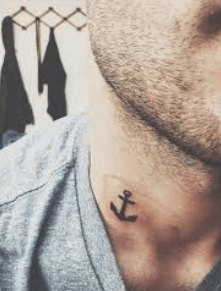
If you have moles on your neck and you want to get a neck tattoo, be sure to get the moles evaluated before you get your neck tattoo to ensure that there is nothing to worry about.
However, even if you do not have moles on your neck, but you spend a lot of time in the sun, when you get a neck tattoo, you should still monitor the area, as your neck is usually exposed and not covered by clothing. Thismakes your neck susceptible to damage from the sun, which can cause cancers too.
Ensure that you know exactly what your tattoo looks like and feels like, and if you pick up any concerning changes, then it is best to seek medical care to check it out.
The Tattoo Could Affect How You Sweat
Some tattoos may interfere with how your body sweats in the area that the tattoo is placed. The tattooed skin usually sweats about fifty percent less than nontattooed skin. The composition of your sweat changes, too, with a more concentrated amount of sodium being released in sweat from tattooed areas of skin.
Your skin normally reabsorbs the electrolytes and sodium that was released during sweating; however, tattoos could partially block this process of reabsorption. Smaller tattoos do not really matter in this case. Larger tattoos, however, could cause this to happen.
Large tattoos that are close to areas with sweat glands may impede your body from cooling down properly and holding onto nutrients. This can cause thermoregulatory problems if you are exposed to high heat or have a heavy physical workload. For this reason, if you are an athlete or someone who works in hot weather conditions, you may want to avoid a large neck tattoo.

There Are Lots Of Nerves In The Neck
There are many nerves in the human neck, and the skin on the neck is usually relatively thin. If you do not have a competent tattoo artist, you could do some damage to the nerves that are quite close to the surface of the skin on your neck.
Although this is quite rare, this can cause loss of feeling in little patches of skin on your neck or pins and needles feeling in certain areas.
Keloid Scarring
All tattoos have the potential of developing scars. Your tattoo could potentially scar if your tattoo does not heal properly. This could be from your tattoo getting infected, or you’re having an allergic reaction to your tattoo. If your tattoo scars, you do have the potential to develop keloid scars.
Keloid scars are a build-up of scar tissue, usually caused by a wound, and as we know, tattoos are considered wounds. The symptoms of keloid scar include a patch of itchy skin, a ridged or lumpy area of skin that can be slightly raised, and the area can keep growing larger with scar tissue.
Keloid scars are not usually harmful. However, you could feel tenderness, discomfort, and skin irritation from clothes and other items. The keloid scars could also distort the design of your tattoo if they get big enough. The tight, hardened scar tissue may also restrict certain movements.

Although Keloid scars are not really a health concern, you may feel self-conscious about a large keloid in a visible area such as your neck, and you may have discomfort when trying to move your neck.
Things To Consider With A Neck Tattoo
Now that we have reviewed the risks of a neck tattoo, there are a few other things you need to have in mind to prepare for your neck tattoo. These need to be taken seriously, too, as they could mean the difference between a good neck tattoo or a not-so-good neck tattoo, and we all want an excellent neck tattoo as it is going to be on our bodies forever in a highly visible area.
Pain Considerations For A Neck Tattoo
Neck tattoos are notoriously painful. You need to ensure you have the pain tolerance to sit through the entire tattoo section without wriggling and squirming around. Remember that the neck has lots of nerves in it, meaning there are many pain receptors to anger in this area.
If you wriggle during the tattooing process, then the tattoo artist may slip and make a mistake on your tattoo design.
If you are tattoo-free and you are thinking about getting a neck tattoo for your first tattoo, that may not be a good idea. Instead, get another tattoo in a different location first to see what you can expect and how you will manage the pain. If you cannot take the pain of the other tattoo, then maybe a neck tattoo is not for you, and your tattoo artist will most likely agree.
If you do already have tattoos and you think you can handle the pain, then you should go and speak to your tattoo artist. Certain tattoo artists do not do neck tattoos because of the potential risks and the fact that they can be quite tricky to get right. Your tattoo artist will also probably have a better idea of if you will be able to sit the entire session or not.
Care and Healing
Taking care of a healing neck tattoo can be a tedious process depending on the size of the tattoo. You need to ensure you take care of your neck tattoo properly and follow the aftercare advice of your tattoo artist to the tee. This will minimize the chance of any complications from rising up.
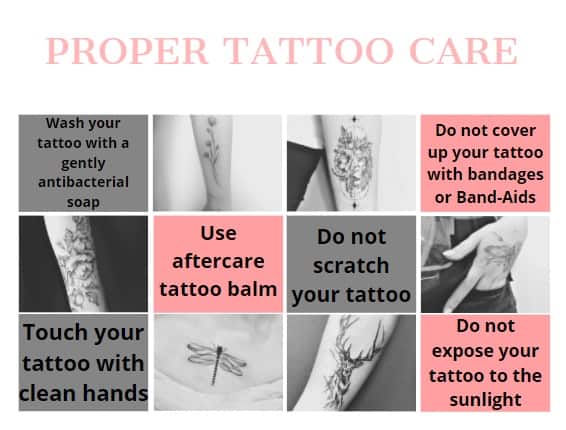
Taking care of a tattoo can take some time out of your day. You need to ensure you will have time to clean your tattoo with warm water and soap as many times as your tattoo artist suggests. You also need to make sure you have enough tattoo balm/moisturizer to last the whole healing process.
Say, for instance, you do not have the time to take care of a neck tattoo, and you get one anyway, then this could lead to an infection or scarring of the tattoo or something even worse. If you do not have the time for tattoo aftercare, then do not get a tattoo.
Your Tattoo Artist May Decline A Neck Tattoo
As mentioned above, some tattoo artists will not do neck tattoos. If your tattoo artist recommends another tattoo artist for your neck tattoo, you should still do your research on that tattoo artist. You need to ensure that you get a great tattoo artist with loads of experience in neck tattoos to do your neck tattoo.
You will most likely get a better neck tattoo from a tattoo artist who knows how to work the thin skin on the neck properly without causing a blowout. Not all tattoo artists can do this or are confident enough to do this. However, no matter who gets recommended to you to get your neck tattoo done, always do your research.
Complications With Medical Procedures
If you are someone who requires medical procedures that use MRIs on a regular basis, then you may want to reconsider getting a neck tattoo. MRIs have a chance of interacting with your tattoo. As stated earlier, tattoo ink and pigments could be made out of metal salts and could still have small traces of metal in them.
This tends to happen more with low-quality inks and pigments or if the tattoo is quite old and the ink or pigment has broken down slightly in the skin.
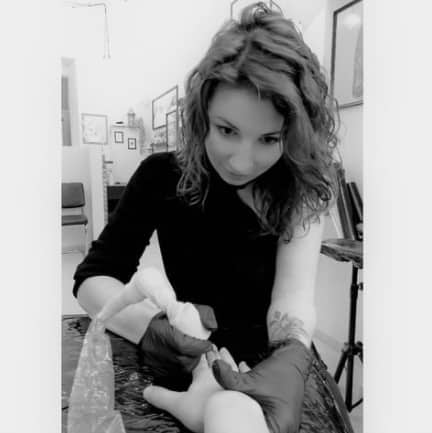
Some of the effects of this include itchiness and swelling of the area. Although the reaction is not extremely harmful and is relatively rare, if you have the test done on a regular basis and get this reaction, it could be uncomfortable and get annoying.
What If You Have A Problem With A Neck Tattoo
Even if you have taken all the precautions possible and you have followed the aftercare advice from your tattoo artist, things can still go wrong, and your skin can still have a reaction to the ink. The following are just a few ways that may help with an infection or allergic reaction with your neck tattoo and when you should seek medical attention.
Symptoms Of An Infection
When your skin is infected, it will react differently than what you would expect in the healing process. The redness of the skin will darken and spread, red and itchy lumps may appear in and around the tattoo, pain may increase, you can develop a fever, chills, open sores in the tattoo, and pus leaking from your tattoo.
These are all indications of a severe infection in your neck tattoo, and it can worsen over time. As soon as you start to develop any of these symptoms or you suspect you may have an infection. It is time to go and see your doctor. The sooner you start treatments then, the less damage the infection can do to surrounding tissues and your tattoo.
Allergic Reactions
Allergic reactions can range from severe to moderate. The following are symptoms of a severe allergic reaction: racing heartbeat, difficulty breathing, a tightness in your chests, stomach aches, light-headedness or dizziness, hives, severe pain, flushing, or intense swelling.
If you do develop any of the signs mentioned above, you need to seek medical attention immediately.
Signs of a moderate to mild allergic reaction are a noticeable change in how your tattoo looks and feels with no other symptoms that affect other parts of your body, like breathing troubles.
For mild to moderate allergic reactions, you can go and speak to your tattoo artist and ask if they have any advice to treat the reaction. However, if the symptoms persist for one to two weeks, then you should go see your doctor.
If you are concerned about your new neck tattoo, go and speak with your tattoo artist, as they may be able to help or advise with any reactions or concerning symptoms you may develop and answer your questions.
Conclusion
Neck tattoos can be dangerous if you do not prepare for them properly. There are reactions that can happen that are out of your control, like an allergic reaction, but for those, you need to monitor them and go and see your doctor if they get worse.
Ensure you have a good tattoo artist that is right for you. They will be able to walk you through the whole process and potentially help you if something goes wrong.
If you look after your neck tattoo properly, then the likelihood of you having any issues is relatively small.



